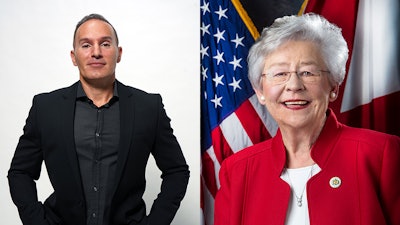
Alabama’s medical cannabis regulators have deviated from state law in their licensing process and now find themselves in an “endless loop” of do-overs, Verano Holdings CEO George Archos wrote Thursday in an open letter to Gov. Kay Ivey.
Ivey, who has served as Alabama’s governor since 2017, signed the state’s medical cannabis legislation, the Hall Compassion Act, into law in May 2021.
Archos, a first-generation American who founded Verano in 2014 on the runway of a single medical cannabis cultivation license, now leads one of the biggest cannabis companies in the world with more than 3,700 employees across 13 states. He said his company remains ready to invest at least $40 million in Alabama’s forthcoming medical cannabis program and communities throughout the state.
But that investment is dependent upon his company landing on the winning side of what now has become a legal battle against the Alabama Medical Cannabis Commission (AMCC). Verano, one of 21 businesses awarded a medical cannabis license June 12 by the AMCC, is now suing the state regulatory agency for its attempt to void that license due to “potential inconsistencies” in the scoring of applications.
RELATED: Verano Sues Alabama Regulators Over Voided Licenses
In his open letter to the governor on Aug. 24—three days after Verano filed the lawsuit—Archos said state officials designed a licensing system to keep politics and personal preferences out of the licensing process.
“Several years ago, the Alabama Legislature learned from the experience of other states in developing Alabama’s cannabis program,” Archos wrote. “They crafted a series of fair, objective, third-party, and blind scoring metrics and established administrative procedures to ensure licenses were awarded to best-in-class operators.”
When the original batch of 21 licenses were awarded June 12, Verano was one of five awardees in the coveted vertically integrated licensing category, meaning its subsidiary, Verano Alabama LLC, stood the opportunity to capitalize on cultivation, processing and five retail operations in the state’s forthcoming market. Non-vertical licenses were also awarded in the cultivation, processor, dispensary, transporter and testing lab categories.
Four days after the initial batch of awardees was announced, AMCC board members voted to put a stay on all licensing proceedings because of the “discovery of potential inconsistencies in the tabulation of the scoring data” and to provide time for an independent review. AMCC officials went on to contract Klynveld Peat Marwick Goerdeler (KPMG), an auditing firm, to review the scoring used to rank the license applicants.
“The commission will work expeditiously to investigate and identify inconsistencies in the score data” AMCC Director John McMillan said in a June 16 news release. “Out of an abundance of caution, we are suspending all current procedural timelines until those matters are resolved.”
Two months later, on Aug. 10, the commission members decided to void the original licensing process altogether and “re-award” the licenses. AMCC board members met behind closed doors in executive session that day to determine which of the 90 applicants would be re-awarded. Verano was not one of them.
Company officials claim in the lawsuit they were given no explanation nor the opportunity to be heard that day. And Archos indicated in his open letter to Ivey that Verano scored as “the top-rated” applicant in Alabama during both the original and re-awarding licensing processes.
“Imagine our surprise weeks later when the commission sought to ‘void’ its June proceedings, deliberate behind closed doors, and change the result by casting aside the objective licensing system Alabama’s elected representatives created,” Archos wrote.
Editor’s note: Cannabis Business Times submitted a request to the AMCC for comment.
Archos added in his letter that as a first-generation American, he believes in the American dream.
“As an entrepreneur, I know the value of hard work and that respect and trust are virtues that are earned, not given,” he wrote.
While countless lawsuits continue to unfold throughout the nation following cannabis licensing processes—which have included luck-of-the-draw lotteries, social equity-based prioritization, and merit-based scoring systems—the circumstance in Alabama are somewhat unique.
Verano is not suing the state regulatory agency because it did not win or because it was left out of consideration. The multistate operator is arguing in Montgomery County Circuit Court that the AMCC broke its own rules and does not have the statutory authority to rescind a license once that license is already awarded.
And Archos indicated in his open letter to Ivey and the citizens of Alabama that this litigation could take years to unfold, which could potentially delay patient access to medical cannabis.
“Verano is seeking the assistance of the Alabama judicial system to intervene to restore order and due process to these official proceedings for the benefit of all applicants and citizens,” he wrote. “Alabama’s patients in need deserve better than years of litigation; they need best-in-class operators to come to the state who can quickly build this new industry from the ground up.”
The AMCC’s next public meeting is Aug. 31, when commissioners could conduct another re-awarding process after concerns emerged that they potentially violated the state’s Open Meetings Act when they went into executive session on Aug. 10, the Alabama Political Reporter reported.Verano Open Letter to Governor Ivey and Citizens of Alabama (8!24!2023)321 by Tony Lange on Scribd


























